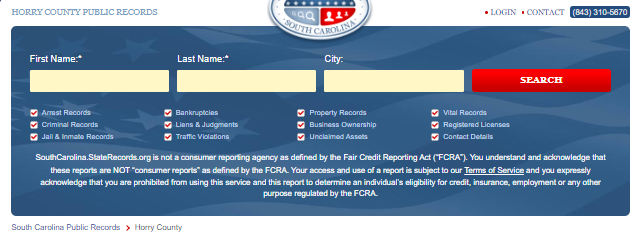Horry County Arrests Records – Arrests.org
Horry County actively receives comprehensive crime statistics from the South Carolina Law Enforcement Division (SLED), providing valuable insights into the county’s law enforcement landscape. The 2017 statewide crime report for Horry County, furnished by SLED, highlights significant figures that illuminate the county’s crime trends. These figures include 27 murders, 346 sexual batteries, 306 robberies, and 1,086 aggravated assaults. Property crime incidences reported encompass 2,330 burglaries, 11,267 larcenies, 1,318 motor vehicle thefts, and 60 arsons.

Analyzing these statistics against 2013 data reveals notable trends in crime rates within Horry County. The murder rate surged by 125%, sexual battery by 57.3%, and larceny by 6% in 2017. Conversely, a five-year trend analysis indicates declines in robbery (18.6%), aggravated assault (4.5%), burglary (16.5%), and motor vehicle theft (0.3%) rates between 2013 and 2017. These active insights into crime dynamics within Horry County empower law enforcement agencies and community stakeholders to make informed decisions and implement strategic initiatives aimed at enhancing public safety and well-being.
Click here to check this: https://southcarolina.staterecords.org/horry
Accessing Criminal Records
The South Carolina Law Enforcement Division (SLED) offers statewide background checks for Horry County residents, facilitating name-based criminal history inquiries. Citizens can conduct these checks via the SLED CATCH portal or submit mail requests. The portal enables quick access to criminal history records for public viewing and printing, charging $26 (inclusive of a $1 convenience fee) per check. Approved organizations like charities benefit from a reduced fee of $8, while school districts inquire about their teachers’ backgrounds at no cost.
For mail requests, individuals must complete the Criminal Records Check Form, specifying whether they need certified and/or notarized records. The completed form, along with payment and a self-addressed stamped envelope, should be sent to the SLED Records Department.
Local Law Enforcement Agencies
Horry County boasts various law enforcement agencies, including the Horry County Sheriff’s Office, Horry County Police Department, South Carolina Highway Patrol, and several municipal police departments. The Horry County Sheriff’s Office provides local criminal history records, while the Police Department offers incident reports. The South Carolina Highway Patrol handles accident reports within its jurisdiction.
For local background checks, residents can visit the Horry County Sheriff’s Office during specified hours, presenting a completed Records Check Request Form and valid identification. Meanwhile, incident reports can be obtained from the Horry County Police Department’s Records and Warrants Section.
Court Records Access
Horry County hosts Circuit, Family, and Probate Courts at the Government & Justice Center, with the Clerk of Court overseeing record management and charging nominal fees for copies. Furthermore, Magistrate and Municipal Courts are situated across the county, providing both online access to records and in-person services for residents seeking legal assistance.
Vital Records
The South Carolina Department of Health and Environmental Control (DHEC) is responsible for managing vital records, such as birth, death, marriage, and divorce certificates, for Horry County. Residents of the county have the option to request these records either in person or via mail. The process entails following specific application procedures and paying requisite fees as mandated by the DHEC.
Overall Transparency
Horry County demonstrates a commitment to transparency, aligning with the South Carolina Freedom of Information Act. While accessing certain records may vary in ease, online record-finding services such as State Records can aid in obtaining elusive information.
In summary, Horry County offers a comprehensive array of legal resources, enabling residents to access vital records, criminal histories, and court documents efficiently.
FAQS
How can I obtain a copy of my own criminal record in Horry County?
To obtain a copy of your own criminal record, you can request a background check from the South Carolina Law Enforcement Division (SLED). Visit the SLED CATCH portal or send a mail request to the SLED Records Department. There is a fee for this service, and you will need to provide identification and complete the necessary forms.
Can I request information about an inmate’s release date and charges in Horry County?
Information about an inmate’s release date and charges may be available through the J. Reuben Long Detention Center. Contact the detention center directly to inquire about an inmate’s status. Keep in mind that certain details might be restricted due to privacy and security concerns.
Are mugshots considered public records in Horry County?
Mugshots are generally considered public records, but their release is subject to legal restrictions and privacy considerations. You can inquire about obtaining mugshot details from the relevant law enforcement agencies in Horry County. However, the use and dissemination of mugshot information may be governed by specific laws and regulations.
How can I find out if a specific individual has a criminal record in Horry County?
To find out if a specific individual has a criminal record, you can request a background check through the SLED CATCH portal. You will need the individual’s consent and possibly a signed waiver to access their criminal history records. Alternatively, you can contact local law enforcement agencies for specific inquiries regarding criminal records.
Are there any restrictions on using mugshot images obtained from law enforcement agencies in Horry County?
Yes, there are restrictions on using mugshot images. While mugshots are public records, their use is often regulated by state laws. Using mugshots for commercial purposes, such as on websites that charge access fees, might be restricted or prohibited. Additionally, using mugshots to harass, intimidate, or defame individuals could lead to legal consequences, including civil lawsuits.
